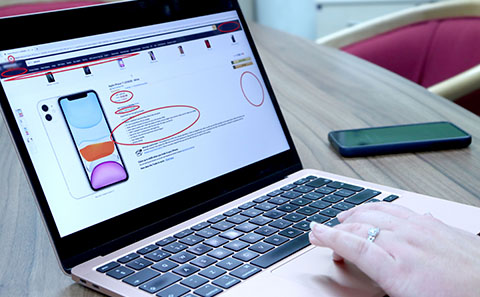Slow down your thinking to spot fake websites

Engaging your brain in ‘analytical reasoning’ could save you from being duped by a fake website, according to research from the University of Southampton.
Studies have found that those who used slower, more deliberative thought processes were less likely to fall victim to fraudulent websites than those using faster, more intuitive thinking patterns.
Scammers use fake versions of popular consumer websites to steal personal information, money, and banking details. In 2020 alone, spoofing attacks like this cost U.S. consumers well over 200 million dollars. Researchers from the University wanted to see if certain thought processes could make a person more resilient or more susceptible to this kind of fraud.
The theory that humans use two distinct modes of thought was popularised in the bestselling book Thinking fast and slow by Daniel Kahneman. It distinguishes between System 1 processes, which are automatic, intuitive and emotional, and System 2 processes (analytical reasoning), which are slower and more logical.
In a series of studies, around 300 participants were asked to spot fake websites from genuine ones. Participants also completed a Cognitive Reflection Test to see how likely they were to engage in analytical reasoning.
“We found that those with a greater propensity to engage in analytical reasoning were better able to detect fake websites,” says Doctor Nicholas Kelley, Lecturer in Social Psychology at the University of Southampton, who led the research.
“Fraudsters are constantly trying new ways to exploit our familiarity with technology. Slowing down and thinking things through carefully, particularly when asked for sensitive information, are broad psychological tools people can use to protect themselves online.”
When participants were put under time pressure, which engages the fast System 1 mode of thought, they performed worse in being able to spot fake websites.
Co-author Professor Yaniv Hanoch added: “Fraudsters will often engineer an emergency or time pressure to make you rush and act on emotion rather than reason. Our research shows how this can lead people to make mistakes that could be very costly to them.”
When the same tasks were performed with IT professionals, the link between analytical reasoning and detection wasn’t apparent, suggesting these experts could trust their intuition.
The researchers also wanted to see what part memory played in analytical reasoning. Participants were given a list of tips for spotting fake websites before completing the tasks and were then asked to recall the tips later. Those with higher analytical reasoning ability were also better able to recall the tips and, unsurprisingly, were better able to spot the fake websites.
The research Analytical reasoning reduces internet fraud susceptibility was published in Computers in Human Behavior and is available online.